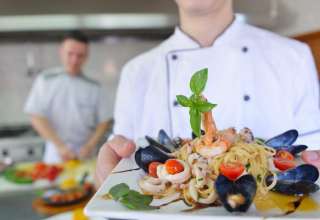A hardly-known Italian grape variety and an English sparkling wine have won trophies at the International Wine and Spirit Competition for the first time.
Ruché, a black grape from Piedmont in the north of Italy was plucked from obscurity in 2011 when it was given its own appellation, Ruché di Castagnole Monferrato.
The International Indigenous Grape Varieties Trophy has gone to the Montalbera Laccento 2015, a wine described as “love at first sip” by the judges.
They said: “It’s warm, scented and seductive to the nose, with sweet nuances of raspberry coulis, and a dash of cloves, wonderfully harmonious, intense and genteel… soft and silky … delicate and very refined.”
What makes a grape “indigenous” or native can difficult to define. The so-called “noble” grapes – Chardonnay, Cabernet Sauvignon, Riesling, Pinot Noir – are grown worldwide but others, like the Italian Primitivo, the Georgian Saperavi, or Ruché, are only found in one place.
The Indigenous trophy was created about 15 years ago to cater for these grapes. It is “highly unusual”, IWSC tasting manager Pip Mortimer said, for a variety as scarce and local as Ruché to win a trophy.
The IWSC – Europe’s oldest wine competition – has just announced the latest winners from France and Italy, as well as its International Trophies. This set of results was released on Sunday at the Vinexpo trade fair in Bordeaux.
In another first, Wiston Estate Cuvee Brut 2013 has won the inaugural IWSC English Sparkling Wine Trophy. This wine, from one of England’s great wine estates, was described by the judges as “composed and elegant with complex notes of brioche fruit and a long finish. Delightful!”
Other trophies included the Madeira Trophy, won by Blandy’s 1980 Terrantez; the Cava Trophy, won by Marrugat Millésime 2011 from Bodegas Pinord; and the Rioja Trophy, won by Altos R Reserva 2012 from Altos de Rioja.
France and Italy trophies include the Prosecco Trophy, won by Villa Sandi Valdobbiadene 2016; and the Vintage Champagne Trophy, won by Champagne Piper-Heidsieck Rare 2002.





